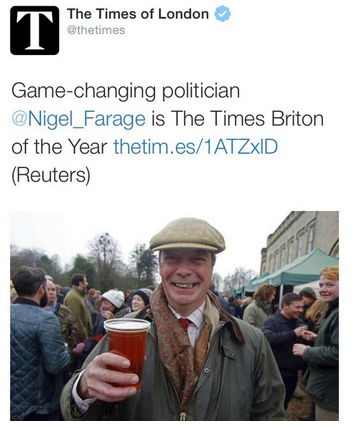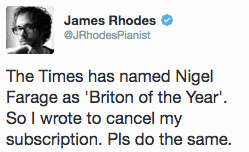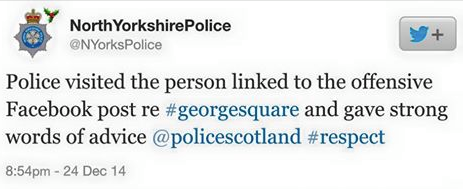The Times uses Nigel Farage to troll the censorious twitter mob of police narks and fools
The Times stands accused of trolling Twitter by voting Ukip leader Nigel Farage it’s Briton of the Year:

The year 2014 may turn out to be Ukip’s high point. As the general election approaches, surging support for the Scottish nationalists could elbow Mr Farage from the limelight. After the election he may decide to spend more time with his cigarettes and pints. For the moment, however, no one did more to shape British politics in 2014. For good and ill he is therefore The Times Briton of the Year.
The twitter hunt goes into full cry. One tweeter, a James Rhodes, grandstands his outrage by cancelling his subscription to the Times:

He reproduces his letter for everyone to marvel at:

Matthew Parris writes about this timid, illiberal, censorious outrage in the Times:
…as we head for a new year, the social media and the news media are blurring together, and in an election campaign the blurring will worsen as politicians clamber over each other to show their umbilical link to public feeling. We’ll be in a chamber of echoes where instant reaction and unthinking response amplify each other into a kind of pitiless roar.
If we in “traditional” politics and “traditional” print and broadcast journalism are not to be swept onward by the virtual mob, we need to review our relationship with the new media. We should stop thinking of social media as an extension of our own work, a reliable generator of good stories, a professional tool. Facebook, the Twittersphere and the world of blogging are not informal journalism. They are the 18th-century mob in 21st-century clothes…
For millennia we’ve been able to duck the possibility of putting the masses in the driving seat because there was no practical way we could. The limits of communications technology made a breakwater against waves of mob sentiment. But think what a difference Twitter (for instance) now makes. Within hours we can know not only the news but what everyone is thinking about the news. Within hours the mob can work itself into rage, certainty or fear, egged on by the news that everyone else thinks so too. Virtual referendums on matters large or small are instant.
We needn’t wait five years to tell our politicians what to do: we can tell them before lunch. If we’d had the social media in the 20th century we’d have brought back hanging: one grisly murder would have sufficed…
As a proud member of the liberal metropolitan elite, I don’t believe in democracy unlimited. Democracy needs restraints, baffles and pauses for thought. The news needs authority. It’s time for those who prioritise news, and time for those who shape policy, to step back, take a cold look at what the virtual mob might mean for public affairs, and ask ourselves whether we want to be part of the epidemic, or part of the vaccine.
And if that were not enough, the police are inviting the Twitter mob to become their narks. And this censorious, reactionary, fearful, narrow-minded mob are happy to play along:

We need a free media. Without it we get only the mob…
Posted: 28th, December 2014 | In: Reviews Comment | TrackBack | Permalink


